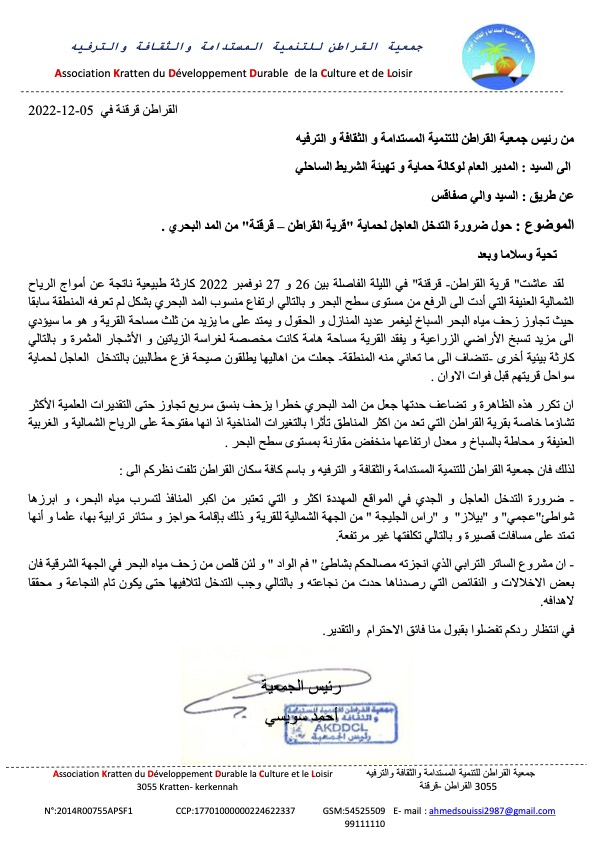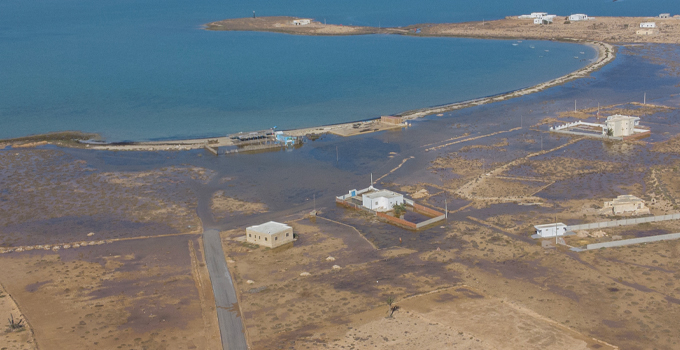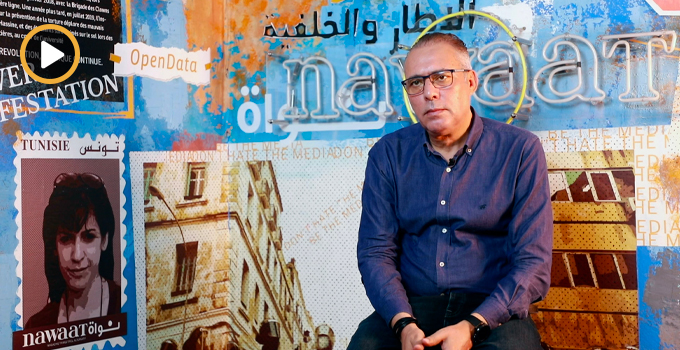It was the night of November 26-27. The sea seemed to have taken over the island. Never before had Kerkennah’s residents seen the water rise so high. Violent winds carried the sea beyond seawalls and into homes, fields and roads, upsetting the island’s ecosystem and marring the collective memory of its residents. One month later, when we arrive in Kraten on the northern part of the island, traces of the sea are still evident.

Rising water levels, result of global warming?
« Look how water has permeated the soil » indicates Abadallah Cheikh, former secretary general of the Kraten Association for Sustainable Development, Culture and Recreation, as he pulls up a handful of earth that is still damp. Elsewhere, olive trees are dying due to salinization of the soil. Palm trees are also dying by the thousands, contaminated by salt. « Not so long ago, Kerkennah’s locals practiced family farming, market gardening, animal husbandry, arboriculture… just enough to not be dependent upon the continent ». Today, this is no longer possible. Over time, drought and salinization of groundwater resources are contributing to the loss of arable land in Kerkennah. In the meantime, the region’s sebkhas, salt lands specific to semi-arid environments, are gaining ground (Sebkhas have increased by 20% over the last three decades). These changes have left Kerkennah’s residents perplexed: « When we built here ten years ago, we never imagined that the sea would nibble away at our land », sighs Abdallah Cheikh.

Not far from these homes, a mausoleum stands overlooking the vastness of the sea. Here more than anywhere else, the threat is palpable. Rocks that were visible less than ten years ago are now submerged by the sea. Soon, the mausoleum too will be covered by water. « I give it one, two years at most », says Ahmed Souissi, president of the Kraten Association. With a maximum altitude of 13 meters and the majority of its land less than 5 meters above sea level, the archipelago of Kerkennah is experiencing climate change in full force. A number of studies have already revealed erosion and the receding of the coastline at a rate of more than 10 centimeters per year. The director of the coastline observatory within the Coastline Protection and Restoration Agency (APAL) Mehdi Belhaj warns against the danger of coastal erosion « which particularly affects small islands such as the Kerkennah archipelago where several low areas are at risk of disappearing by 2030 ».

Rising water levels are also connected to the melting of glaciers and the expansion of the sea as it heats up. According to a United Nations report, the Mediterranean region is one of the primary zones affected by climate change, where warming is taking place at a rate 20% faster than anywhere else and with a one-meter high rise in sea levels by the year 2100. Globally, sea levels have increased by about 15 centimeters during the 20th century; According to the Intergovernmental Panel on Climate Change (IPCC), this rate is accelerating more than expected.
Government incompetence
Beneath a semblance of calm, the archipelago has never been more vulnerable. Residents themselves seem disconcerted: « We witness the effects of instability that are a result of climate change, but we didn’t really understand that we could lose everything », explains Ahmed Souissi. « Unfortunately, authorities do nothing to avoid the worst, in fact, they continue to encourage industrial and tourism projects to the detriment of local populations and the environment », Souissi adds. And the APAL’s various initiatives in the area have done little to reassure locals.

One of these initiatives: seawalls built to block rising water but which failed keep the sea from advancing during the last storm. « Of course it would have been worse without the seawall, but this barrier did not benefit from a thorough enough study. There are many construction flaws and no maintenance », says a resident of Kraten whose home was flooded. « The sea is advancing before our very eyes, but the government is totally absent, we don’t exist for them », he says. In a letter submitted to the General Directorate of Aerial and Maritime Services and to the Ministry of the Environment, the Kraten Association warned authorities of damages caused by rising water levels and demanded immediate intervention against impending dangers.

Dry algae blankets the side of the road as we leave the coast, a reminder of the threats looming before the archipelago. And that’s not all. Tons of waste that have been carried along by the currents have collected along the coastline across the sebkhas. As if the sea were returning to the land—or rather, to its inhabitants—their own waste.
Overfishing and global warming: an explosive cocktail
Rising water levels also impact the archipelago’s primary activity: fishing. Under the triple effect of global warming, over-exploitation and chemical pollution from industrial plants, the entire sector has been jeopardized. In the port of Kraten which is at the very northwest of the island, the late morning bustle that once was is now no more than a distant memory. Fishermen, fishmongers, intermediaries, all recall with nostalgia a bygone era. The impoverishment of halieutic resources worries residents, many of whom depend on fishing. « Our production has been divided by four », says Neji Hdidar, a fisherman who has seen his productivity dissipate over the years. « Sometimes, I even ask myself why there is still a port here! » he adds.

Ahmed Souissi has no doubt that the kiss [bottom trawling] method which over recent years has become the preferred technique is largely to blame: « It’s a fishing technique which involves scraping the seafloor to maximize the number of fish captured, but which destroys all of the flore including Posidonia which plays a central role against coastal erosion ». Although the kiss method was officially banned in 1942, the number of trawlers has continued to increase since 2011. « Illegal fishing has become a plague. Walk around the port and you’ll see the number of unregistered boats. These are criminals, they have razed everything. The marine floor has become a carpet », says a fisherman who still practices charfia, a traditional fishing technique. « Why does the State keep its eyes closed? Why aren’t laws respected? » he wonders. A fisherman since the age of 15—for some 40 years now—our interlocutor is filled with dread each time he sets out to sea. The invasion of blue crab, the phenomenon of red tide which kills many fish, and the depletion of certain species do not bode well. The president of the Kraten Association dares to hope that these natural disasters will shake the State out of its lethargy: « Perhaps it will take more occurrences like what took place on November 27 in order for sustainable solutions to be conceived ».






iThere are no comments
Add yours